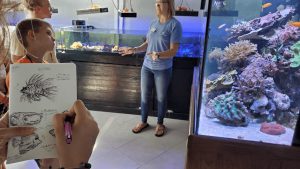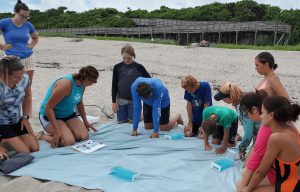WEST PALM BEACH, Fla. — We all look forward to summer vacation. It’s when many families take time to make the most of their adventures without having to worry about school projects, tests and homework.

The downside of summer school vacation is the return of what some educators call “the summer slide”. Studies have shown that summer months can result in a decline in reading and other academic skills for their students. It’s an expected result when fun in the sun is in, and school is out.
Noelle Guay, a biologist at heart who serves as a UF/IFAS Extension Palm Beach County 4-H agent and program leader, saw the problem as the perfect opportunity to build some champions.
She developed a type of saltwater classroom where shark tagging, coral propagation, and snorkeling are just a few of the activities that campers and counselors partake in during a weeklong 4-H Marine Science Camp in Palm Beach County.
The camp’s beginnings were rooted from a desire to connect and engage kids with the marine environment and its careers in South Florida.
“I had been noticing how today’s kids were becoming less invested in marine sciences because they weren’t being exposed to the perfect environment that South Florida provides for the many careers in this field,” added Guay.
That was more than four years ago.
The activities and structure of the camp serves as an opportunity to develop champions for the marine environment by exposing them to the resources, the careers, and the science.
“It’s designed with a learn-by-doing approach that focuses on fun, hands-on, real world activities to enable youth to explore marine science while gaining critical life skills, including teamwork, communication, leadership, and independence,” said Guay.
For camp counselor Marko Micunovic, 16, of West Palm Beach, the camp has provided him with leadership and research skills over the last two years that are both vital to his career dreams and passion for marine conservation.

“I want to be a neurosurgeon and I would recommend everyone to get involved in a camp like this in some way. Not only do you build on your leadership qualities and add to your college resume, but I had hands on experience on how to conduct research. I also learned how to react and mentor in certain situations like on a boat or on an island with young kids. You learn to have an appreciation and respect for the wildlife in a different way.”
On the other hand, Tatiana Turney, 10, of West Palm Beach, has made the camp a regular summer activity for the last three years with every lesson being a new adventure. She is considering a career in marine biology.
“I like that we learn about all kinds of things like the fact that coral and jelly fish are similar in many ways. Also, that more than 100 million sharks are killed each year by humans which is why I think shark tagging is so important.”
Last week, Guay celebrated the fourth year of the camp with 15 campers, ages 9 to 13, and 10 teen counselors ranging in ages from 14-18. Participants toured a variety of marine habitats to understand the importance of the marine environment to their lives and how their actions have an influence on the ocean.
“The ultimate goal is engaging youth in marine citizen science work and developing them into environmental ambassadors,” said Guay.
The agenda of activities included coral propagation, shark tagging, learning about turtle conservation, a mangrove tour to learn about their importance to the marine ecosystem, seining to identify local marine life, snorkeling Peanut Island to view local corals and marine life, shorebird identification, an introduction to dichotomous keys, and stingray and shark dissections.
The activities were made possible by a series of partnerships including Nova Southeastern University, the Pompano Dive Center, The Reef Institute, Loggerhead Marine Life Center, John D. MacArthur State Park and the Florida Sea Grant program, a statewide program based at UF/IFAS.
The camp engages youth in STEM concepts during the summer as campers and counselors alike log data, utilize the scientific method, read and follow instructions to identify species, and learn how to be ambassadors for the environment year-round, she added.

By placing problems facing coastal communities such as habitat loss, acidification, over-fishing in our coastal communities in front of our marine environment camper and champions, Guay hopes that the experience will bring the true scale of the issues to light. She also hopes it will bring home the future impacts that they can have on marine issues so they will approach each issue as an to take collective action or become the next generation of scientists and conservationists.
What can future campers expect from next year’s 4-H Marine Science Camp in Palm Beach County? They will have to wait and see since each year brings about new adventures and new partnerships for opportunities for discovery.
To get involved with 4-H in your area, contact your local UF/IFAS Extension office by visiting http://florida4h.org/getinvolved/.
-30-
By: Lourdes Rodriguez, 954-577-6363 office, 954-242-8439 mobile, rodriguezl@ufl.edu
The mission of the University of Florida Institute of Food and Agricultural Sciences (UF/IFAS) is to develop knowledge relevant to agricultural, human, and natural resources and to make that knowledge available to sustain and enhance the quality of human life. With more than a dozen research facilities, 67 county Extension offices, and award-winning students and faculty in the UF College of Agricultural and Life Sciences, UF/IFAS brings science-based solutions to the state’s agricultural and natural resources industries and all Florida residents.
 0
0
